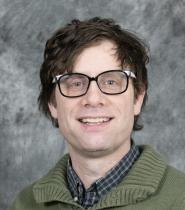
About
I have a background in both the humanities and Computer Science. As such, my interest often the intersection of technology Science at Viterbo University with a penchant for integrating technology into historical studies. I also have spent many years in the field of software development and enjoy exploring the many avenues that this field allows students and myself to explore.
At Viterbo, I teach courses on development within the Computer Science department. Additionally, I contribute to the History department by teaching various courses, leveraging my historical expertise to provide a comprehensive learning experience.
My interest in the intersection of technology and history has led me to various advising roles and speaking engagements. I've presented at conferences on topics ranging from surveillance implications to prosperity theology's impact on American religion. As such, my research interests quite diverse.
My current research project tackles the complexities of university course timetabling, a puzzle that has intrigued scholars and administrators alike. This project is a foray into the application of computational algorithms to create efficient, conflict-free academic schedules accommodating diverse course credits and faculty availabilities. This research focuses on developing a new approach to university course scheduling using a Reconstructive Multi-Objective Hybrid Mixed Integer Genetic Algorithm. This method combines heuristic strategies with Mixed Integer Programming (MIP) and Genetic Algorithms (GAs) to tackle the complex challenges of course timetabling. By reorganizing schedules around established academic time-slot patterns, the approach aims to reduce complexity and improve scheduling flexibility, providing a more adaptable solution for academic institutions. This work explores how these algorithms can offer practical improvements over traditional scheduling method
My research on COVID-19, showcased through the Balefire.info Covid social data explorer, stands at the confluence of epidemiology and data science. By meticulously tracking the longitudinal data of the pandemic alongside related social factors, this project offers a granular view of the virus's impact on communities. The platform, built with collaboration from various data providers, harnesses sophisticated data analytics to uncover trends and correlations that inform public health decisions. The insights drawn from this research not only contribute to our understanding of COVID-19's societal effects but also enhance our preparedness for future public health challenges.
Modeling Meaning in the Early Republic is a digital humanities project that applies modern natural language processing techniques—especially transformer-based large language models (LLMs)—to the study of political discourse in the Founding Era. By fine-tuning LLMs on 18th-century American texts, the project generates historically grounded word embeddings that capture how meanings of key terms like freedom, property, and democracy were shaped by their original context. This allows for the study of semantic drift over time and across authors, revealing subtle shifts in how early American thinkers framed concepts of power, labor, and citizenship. The project demonstrates a novel use of contextualized embeddings for diachronic analysis, bridging computational linguistics and historical inquiry. It contributes to the growing field of historically informed NLP by showing how transformer architectures can be repurposed not just to generate text, but to recover and visualize the conceptual structure of past political language.
In this research project, I collaborate with external faculty to investigate the relationship between surveillance cameras and crime prevention, acknowledging the complexity and ambiguities present in the existing literature due to the use of problematic datasets. Our study leveraged advanced geospatial analysis techniques, such as kernel density estimation (KDE) and spatial autocorrelation, to test broader hypotheses. We incorporated methods like buffer analysis to examine crime incidents within a specific radius before and after the installation of surveillance cameras. Additionally, we integrated census data and applied spatial regression models to control for various socio-economic variables, enhancing the robustness of our analysis.
The dataset we utilized was notably more consistent and reliable compared to those used in prior studies, which often feature varying dates and inconsistent surveillance usage patterns. This allowed us to conduct a more precise temporal analysis and to draw clearer conclusions about the effects of surveillance on crime patterns. Our preliminary findings indicate that many assumptions in the existing literature are not well-supported, as the correlations between camera presence and crime reduction are not as definitive as previously suggested. This study highlights the need for further research using more rigorous data and sophisticated geospatial methodologies to better understand the nuanced impacts of surveillance technologies on crime dynamics.
In my publication, "Using Geospatial Data to Inform Historical Research in R," I explored the intersection of history and technology by demonstrating how the programming language R can be used to analyze and visualize geospatial data within a historical context. This work serves as a guide for historians and researchers interested in employing quantitative methods to enrich their qualitative inquiries. By leveraging R's capabilities to map historical events, patterns, and movements, I provided a new lens through which we can interpret the spatial dimensions of history.
My Dissertation traced the contours of Sunbelt Pentecostalism set against the backdrop of post-World War II America, revealing the intricate interplay between faith, media, and the burgeoning consumer culture. Through this lens, my dissertation, "Creating heaven on earth," not only chronicled the spiritual aspirations of the time but also highlighted the socio-economic transformations that Pentecostalism underwent during a period of rapid change.
My current research project tackles the complexities of university course timetabling, a puzzle that has intrigued scholars and administrators alike. This project is a foray into the application of computational algorithms to create efficient, conflict-free academic schedules accommodating diverse course credits and faculty availabilities. This research focuses on developing a new approach to university course scheduling using a Reconstructive Multi-Objective Hybrid Mixed Integer Genetic Algorithm. This method combines heuristic strategies with Mixed Integer Programming (MIP) and Genetic Algorithms (GAs) to tackle the complex challenges of course timetabling. By reorganizing schedules around established academic time-slot patterns, the approach aims to reduce complexity and improve scheduling flexibility, providing a more adaptable solution for academic institutions. This work explores how these algorithms can offer practical improvements over traditional scheduling method
